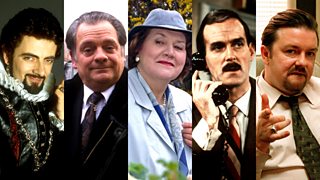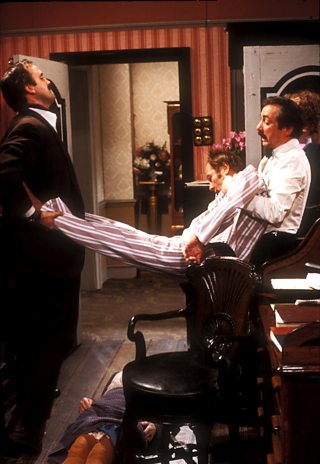Forget self-improvement and self-actualisation, when it comes to writing good comedy characters, well rounded human beings need not apply. Dysfunctionality is very much the order of the day.
Consider the great comedy characters: Blackadder, Hyacinth Bucket, David Brent, Del Boy. Would you honestly want to be stuck in a lift with any of them? Possibly not, after all they are all deeply flawed human beings, but it is exactly these flaws that raise them to the level of comedy greats.They exhibit any number of negative personality traits: incompetence, lying, cowardice, rudeness, pomposity, dishonesty, insecurity, neurosis.

(l-r) Blackadder (Rowan Atkinson), Del Boy (David Jason), Hyacinth Bucket (Patricia Routledge), Basil Fawlty (John Cleese), David Brent (Ricky Gervais)
Not only do their failings render them more appealing as three-dimensional human beings, they are essential in bringing them to life as comedy characters. Their defects provide the very mechanism that is going to get them into trouble, complicate their lives, up the stakes, scupper their plans.
So comedy characters need to be flawed but they need to be flawed in a way that puts them in perpetual conflict with themselves or their environment. There has to be some fundamental contradiction at the heart of their soul or their situation, some disparity between how they see themselves and the actuality of their circumstances. A glaring reality gap that cannot be reconciled.
In The Office believes himself to be an extremely talented comedian, of course in reality his “comedy” is unoriginal and badly executed and the results are invariably cringeworthy.
In Saxondale, is a former roady now pest control officer living in Stevenage. The former wild man of rock n roll is now middle aged and living in boring suburbia. But it is a truth he is not ready to admit to himself. In his head he remains a fully paid up member of the counter culture. His rock n roll pretensions constantly hit up against his mundane reality. A wealth of comedy ensues as he attempts to square the circle and reconcile the irreconcilable.
In Motherland Julia is a successful events organiser keen to project an image of effortless efficiency. This belies the reality of a fallible human being struggling to juggle the demands of work and motherhood. However, fearing the judgement of the other mums, she finds it difficult to admit her imperfections. Her constant attempts to bridge the gap between private reality and public image provide the engine for the comedy.
Watch a clip from Episode 1 of Motherland: Impressing the Alpha Mums.
Remember a character defect isn’t just for Christmas it is for life. Comedy characters need to be conflicted and it is a conflict that must never be resolved. Imagine if David Brent actually became a good manager or Blackadder suddenly started respecting his superiors. What would happen to the comedy then? You want an inherent flaw that will never be resolved and therefore can be relied upon time and time again to generate jokes, constantly discomfiting the character and driving the comedy. Scene after scene, episode after episode, season after season.
Not only do a character’s defects trigger jokes but they are essential for driving the story line. A common fault is that scripts suffer from a passive protagonist. Funny things keep happening to this character but they are never quite in the centre of it. They are less a protagonist, more a hapless victim, a sort of innocent bystander caught up in a series of unfortunate events. But a good comedy character should never be an innocent in their own demise. They should be as guilty as hell.
You want to put your character in the driving seat, causing the mayhem, digging themselves into a hole, hoisting themselves on their own petard. Make them proactive in the worst possible sense of the word. Make them the author of their own downfall by either instigating an original problem or by taking an existing one and escalating it.

John Cleese, as Basil Fawlty and Andrew Sachs, as Manuel attempt to conceal the corpse of a dead guest from the other residents of Fawlty Towers (Image from Series 2, Episode 4 of Fawlty Towers, copyright ±«Óãtv)
is a good example of the latter. In Fawlty Towers, Basil is rarely the originator of his troubles. Events outside his control conspire against him: a guest dies during the night, the chef gets so drunk he passes out, a confidence trickster comes to stay at the hotel. None of this is strictly his fault but a reasonable person would muddle through and make the best of a bad situation. The point is Basil is not a reasonable person and he has no intention of making the best of a bad situation. So when his wife storms out in minutes before her surprise party, he cannot simply admit to their friends what has happened. Instead he constructs a whole web of lies, getting more and more convoluted, claiming that she is seriously ill in bed. Finally being forced to bribe the maid into dressing up and pretending to be his wife.
It is his personality defects, his inability to loose face and his propensity for lying that embraces the initial problem and gives it rocket boosters
Watch the Falling Cow clip from Alan Partridge
Alan Partridge, on the other hand, is brilliant at conjuring his own problems from thin air. In the episode Watership Alan he gets flattened by a dead cow, thrown by angry farmers, midway through filming a corporate video. This is no random assault. He has created this crisis by insulting farmers live on his radio show. His crass and ignorant comments have kick-started the whole business. Of course he could simply apologise and be done with it but his brittle ego won’t allow that. Instead during a later interview, where he is supposed to apologise, he ups the ante, standing by his original comments and then going further, heaping further insult upon further insult, digging himself deeper and deeper into a bigger hole and sealing his fate.
A better adjusted person would simply have apologised and moved on but then a better adjusted person wouldn’t have been a great comedy character. A character’s flaws should impel them to commit acts they don’t want to do. In Motherland Julia has forgotten it is half-term and has unwittingly brought her child into an empty school bereft of pupils. Rather than admit fallibility she concocts a spurious allegation of bullying against an innocent five year old boy. She isn’t a psychopath, she knows what she is doing is wrong, but her inability to concede weakness propels her to act against her better judgment.
So when developing a comedy character remember being a flawed human being has never been such fun! The negatives are really positives. We all have a life time of weaknesses, failings and annoying habits. Dig deep into your own shortcomings and those of your friends and family and use them wisely. It would be a shame to squander such a valuable resource!
We are currently in the middle of the reading process for the latest open submission Comedy Script Room window (closed 16th April). We received 2629 scripts. At least 10 pages of every script will be read.
